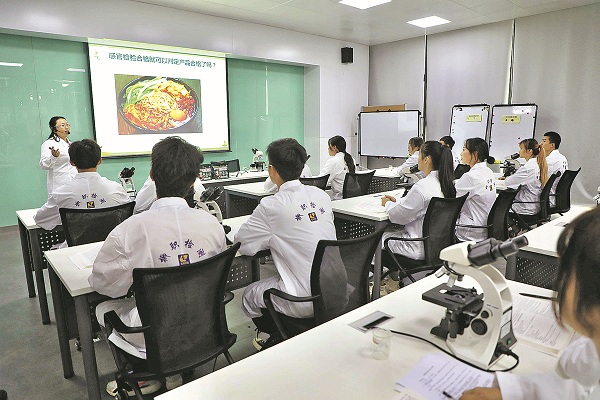Colleges, enterprises cook up profits in Guangxi

Students of Liuzhou Luosifen Industrial College study relevant knowledge about luosifen, or Liuzhou river snail rice noodles, in Liuzhou, Guangxi Zhuang autonomous region, in November 2020. [Photo/China Daily]
Luosifen, pungent rice noodles containing pickled bamboo shoots and river snails, is a dish that has become increasingly popular among young consumers looking for tasty and quickly prepared meals.
It is also a dish that takes its inspiration from the Guangxi Zhuang autonomous region and has created a culinary boom benefiting the region's companies and its people.
With sales of the easy-to-make noodle dish starting to rise, a lot more cooperation between colleges and enterprises in producing and marketing the product is taking place in the region.
In the past few years, co-branded luosifen jointly produced by schools and enterprises has sprung up. Manufacturers have been relying on the resources and cultural intellectual property power of the schools, and colleges have expanded their influence with the promotion of luosifen, which has become a big hit.
Guangxi University of Science and Technology and Guangxi Hugui Food Group Co Ltd collaborated on the research and development of a new variety of luosifen, and the packaged product was released in November. The school has been responsible for R&D on the taste of the soup and control over product quality. The product has been popular with a large number of students.
"Currently, there is still a certain gap between enterprises and colleges in terms of scientific research strength and the availability of R&D talent," said Luo Anfeng, president of Guangxi Hugui Food Group.
"Through cooperation, companies can rely on the scientific research strength of colleges to solve some technical difficulties in the R&D and production process. Enterprises can provide internship opportunities for college students and offer a platform for those students who have entrepreneurial intentions," Luo said.
Packaged luosifen, introduced in 2014 in China, has gained wide acceptance among consumers. Easily prepared meals have emerged as a rapidly growing business due to the COVID-19 pandemic.
From January to October 2022, sales revenue for the whole industrial chain of luosifen in Liuzhou, Guangxi, reached 48.37 billion yuan ($7.2 billion), up 16.48 percent year-on-year, according to Liuzhou's business bureau.
Liuzhou luosifen manufacturers have also expanded sales in overseas markets. The product was first exported in 2016, and now it has been exported to more than 20 countries and regions, such as the United States, Canada, Australia and Malaysia.
In the first 10 months of 2022, the export value of luosifen in Liuzhou reached 55.78 million yuan, up 68.4 percent year-on-year, according to Customs authorities in Nanning.
As the product continues to develop, luosifen makers have been working to make it more convenient to prepare while retaining the original flavor. The firms have been working hand-in-hand with educational institutions, and such relationships help cultivate more talent for the industry, experts said.
In 2020, Liuzhou Luosifen Industrial College was unveiled by Liuzhou Vocational and Technical College. It was created to be a practical training center that fosters practical, innovative workers who master technologies and skills related to luosifen.
Officials said they would emphasize training in four areas — electromechanical equipment, inspection and detection, e-commerce and art design. The courses are offered to full-time students in related majors, or those who would like to take the courses in their spare time or as a minor. The college will also tailor courses based on the needs of enterprises.
The college aims to help cultivate talent for the entire luosifen industrial chain. Relevant areas include automatic equipment maintenance and operational management, quality and safety inspection and management, marketing planning, building sales channels and management, livestreaming and culture and brand promotion.
"Based on the development trends of the luosifen business in Liuzhou and the demand of companies, in 2022, we launched some featured courses such as the operation of online and offline luosifen stores, new media marketing and e-commerce customer service," said Chen Fang, dean of Liuzhou Luosifen Industrial College.
As more Chinese companies leverage the country's booming livestreaming market to boost sales, Liuzhou Vocational and Technical College established a new livestreaming e-commerce industrial college in October 2021 to train more talent.
The college has provided livestreaming training sessions for more than 10,000 people from local small and medium-sized companies and worked with some 20 enterprises.
"Our students have helped local luosifen enterprises sell their products through more than 100 livestreaming sessions, and sales revenues during the sessions exceeded 40,000 yuan," said Meng Liucui, executive dean of the livestreaming e-commerce college.
